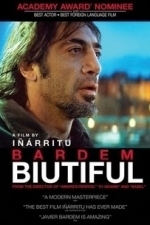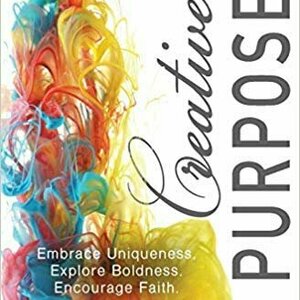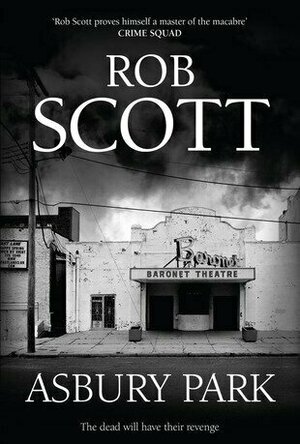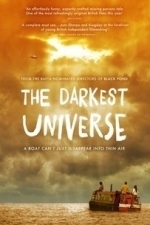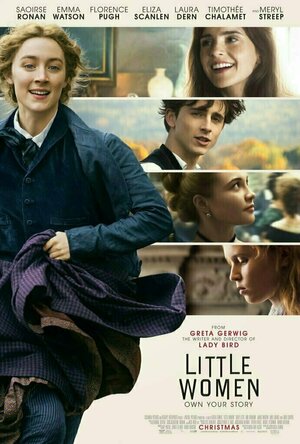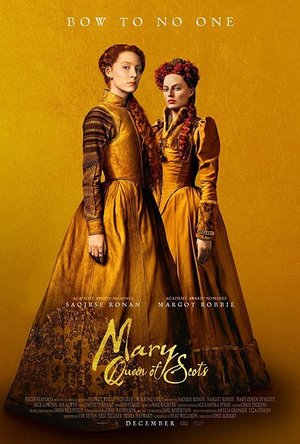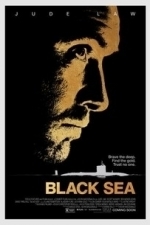Search
Search results
Chris Sawin (602 KP) rated Biutiful (2010) in Movies
Jun 22, 2019 (Updated Jun 23, 2019)
At times, it's difficult to summarize your thoughts about a specific film. It isn't because the film is necessarily so good or bad that it's beyond words, but because you're unsure how to feel about said film until the credits finally roll. Biutiful is such a film.
The film revolves around Uxbal, portrayed by Javier Bardem (No Country For Old Men) sporting a mullet, so expectations are already high. Uxbal has just been diagnosed with terminal prostate cancer, but isn't ready to leave this world. His two children are still young and Uxbal feels that their mother, who's more interested in partaking in promiscuous behavior while dealing with a bipolar disorder, isn't fit to take care of their children. Meanwhile Uxbal supports his family by partnering with both the Chinese and African street merchants that are in the country illegally. Together they sell pirated movies and cheap knockoffs of clothing and accessories made by Chinese men, women, and children that live in a warehouse used as a sweatshop. To top it off, Uxbal has the ability to communicate with the dead and is called upon to help people who have recently passed to let go and move on to the other side. Although hesitant at first, Uxbal has every intention of getting his affairs in order, reconciling his marriage, and making sure his children have someone to take care of them after he's gone. Unfortunately, things don't always go as planned.
Biutiful, its spelling having a simple yet somewhat brilliant explanation, features a lot of symbolism that will go over viewers heads. It also is incredibly similar to Iñárritu's previous works such as 21 Grams and Babel in both style and tone, but is the director's first film to be presented in Spanish. The drama is beyond bleak and practically hopeless. The out of tune soundtrack, the rocks Uxbal gives to his children, and people clutching to the ceiling will leave many scratching their heads. Many ideas seem to be hinted at, but are never fully fleshed out like reflections and shadows moving out of sync from their source. However, the film is driven by Bardem's emotionally draining, physical, and all around powerful performance.
The scene that really makes the entire film worthwhile is the scene in the Chinese warehouse right before Uxbal visits his brother's strip club. It's the most effective, long-lasting, and memorable scene in the film. In the same breath though, what was up with the sound? It was like it was purposely terrible at certain points in the film. At times, it seemed significant to showcase the sound of the characters' heartbeats, but just felt sloppy the one or two other times it occurred. There were also quite a few memorable quotes in the film including, "It's dangerous to trust a man who's hungry."
Biutiful is an unusual drama that is both confusing at times and ridiculously intriguing at others. A vigorously passionate performance by Javier Bardem may not be enough to save what is otherwise a sometimes mindboggling and hellacious journey through the eyes of what seems like the most unlucky man in the world. Even in comparison to his other works, Biutiful seems even more bleak and dreary than Iñárritu's other works. What's bizarre is that the film does give you a strange sense of hope. No matter how bad you think your life currently is or was, this film proves that it can always be worse even if the presentation is more than a little mentally and emotionally exhausting. It's also interesting to note that even though the film leans more to the bizarre side while being downright depressing, it does make a long-lasting impression and sticks with you as you contemplate scenes and occurrences in the film days after you've seen it.
The film revolves around Uxbal, portrayed by Javier Bardem (No Country For Old Men) sporting a mullet, so expectations are already high. Uxbal has just been diagnosed with terminal prostate cancer, but isn't ready to leave this world. His two children are still young and Uxbal feels that their mother, who's more interested in partaking in promiscuous behavior while dealing with a bipolar disorder, isn't fit to take care of their children. Meanwhile Uxbal supports his family by partnering with both the Chinese and African street merchants that are in the country illegally. Together they sell pirated movies and cheap knockoffs of clothing and accessories made by Chinese men, women, and children that live in a warehouse used as a sweatshop. To top it off, Uxbal has the ability to communicate with the dead and is called upon to help people who have recently passed to let go and move on to the other side. Although hesitant at first, Uxbal has every intention of getting his affairs in order, reconciling his marriage, and making sure his children have someone to take care of them after he's gone. Unfortunately, things don't always go as planned.
Biutiful, its spelling having a simple yet somewhat brilliant explanation, features a lot of symbolism that will go over viewers heads. It also is incredibly similar to Iñárritu's previous works such as 21 Grams and Babel in both style and tone, but is the director's first film to be presented in Spanish. The drama is beyond bleak and practically hopeless. The out of tune soundtrack, the rocks Uxbal gives to his children, and people clutching to the ceiling will leave many scratching their heads. Many ideas seem to be hinted at, but are never fully fleshed out like reflections and shadows moving out of sync from their source. However, the film is driven by Bardem's emotionally draining, physical, and all around powerful performance.
The scene that really makes the entire film worthwhile is the scene in the Chinese warehouse right before Uxbal visits his brother's strip club. It's the most effective, long-lasting, and memorable scene in the film. In the same breath though, what was up with the sound? It was like it was purposely terrible at certain points in the film. At times, it seemed significant to showcase the sound of the characters' heartbeats, but just felt sloppy the one or two other times it occurred. There were also quite a few memorable quotes in the film including, "It's dangerous to trust a man who's hungry."
Biutiful is an unusual drama that is both confusing at times and ridiculously intriguing at others. A vigorously passionate performance by Javier Bardem may not be enough to save what is otherwise a sometimes mindboggling and hellacious journey through the eyes of what seems like the most unlucky man in the world. Even in comparison to his other works, Biutiful seems even more bleak and dreary than Iñárritu's other works. What's bizarre is that the film does give you a strange sense of hope. No matter how bad you think your life currently is or was, this film proves that it can always be worse even if the presentation is more than a little mentally and emotionally exhausting. It's also interesting to note that even though the film leans more to the bizarre side while being downright depressing, it does make a long-lasting impression and sticks with you as you contemplate scenes and occurrences in the film days after you've seen it.
What might be sabotaging your uniquely gifted contribution to the world around you? Discover the obstacles and barriers standing between you and your God-given purpose. In this revised book, youll learn how to identify ways to strengthen your calling thatll encourage you to confidently operate in the gifts and talents that God designed you to do. Through the lens of T.H. Meyers own journey, youll recognize the universal struggle in embracing your whole person as she encourages you to live a life without regrets. For the individual reader looking to examine more deeply their life purpose or a group seeking to collectively spur each other toward their God-given gifts, talents, and life. This book can be used as a 12-week, 6-week, or 4-week study guide, with exploratory questions at the end of each chapter the assist you in listening to Gods voice and revealing your unique purpose, path, or direction.
Endorsements A wonderful exploration, but not only for readers to look inwardly, but to also look around at others, at where our lives are at, and mostly upward toward Gods design and dreams for our lives. Love it! Cindy Coloma, best selling and award-winning author of over 15 books Youll come away from this wise and insightful book with a clearer understanding of how you are uniquely gifted to contribute to the world, and why its imperative that you honor your creative calling. Michelle DeRusha, author of Katharina and Martin Luther: The Radical Marriage of a Runway TH Meyer looks at the glass ceiling the world has placed between creatives and non-creatives and shatters it. This those who have felt they are not creative, too timid, or simply too late to the life they were called to live, Meyer says, Pish-posh. She delivers on her promise to help people embrace uniqueness, explore boldness, and encourage faith. Amy Young, author of Looming Transitions: Starting & Finishing Well in Cross-Cultural Service In her book, A Life Of Creative Purpose, Tammy Hendricksmeyer [TH Meyer] is a trusted mentor, offer ing us the tools we need to step completely into Gods design for us as individuals, and as members of His body. Her relatable stories coupled with scripture inspire and ignite a renewed passion for pursuing not only our own creative callings but even more, her words stoke the fire in our hearts for the Giver of these gifts. Kris Camealy, author of Come, Lord Jesus: The Weight Of Waiting A Life of Creative Purpose is a fantastic resource filled with thoughtful questions, stories, and Scripture each designed to awaken us to Gods unique purposes for our lives. It is well-written, thoughtful, and engaging, an invitation to embrace our own eternally significant creative purpose. Cindee S. Re, author of Discovering Hope: Beginning the Journey Toward Hope in Chronic Illness In her book, A Life of Creative Purpose, TH Meyer masterfully blends personal stories with wisdom from Scripture to reveal the importance of creative purpose (even if you think you are not creative.) The thought-provoking questions at the end of each chapter will help you discover (or uncover) and embrace the unique way God has made you and inspire you to step into a life of purpose, meaning, and fulfillment. JoDitt Williams, author/artist of Delight in the Word of God: A Devotional Coloring Book/Journal for Adults
My Thoughts: This is a great book to remind us about the gifts that God has for each of us. It reminds us not to be afraid to step out in faith to use the guts that God gives us to use.
This is a book of encouragement. It helps those who may not know what their purpose or gift is, to learn how to find it.
I enjoyed this book and encourage others to read it.
Endorsements A wonderful exploration, but not only for readers to look inwardly, but to also look around at others, at where our lives are at, and mostly upward toward Gods design and dreams for our lives. Love it! Cindy Coloma, best selling and award-winning author of over 15 books Youll come away from this wise and insightful book with a clearer understanding of how you are uniquely gifted to contribute to the world, and why its imperative that you honor your creative calling. Michelle DeRusha, author of Katharina and Martin Luther: The Radical Marriage of a Runway TH Meyer looks at the glass ceiling the world has placed between creatives and non-creatives and shatters it. This those who have felt they are not creative, too timid, or simply too late to the life they were called to live, Meyer says, Pish-posh. She delivers on her promise to help people embrace uniqueness, explore boldness, and encourage faith. Amy Young, author of Looming Transitions: Starting & Finishing Well in Cross-Cultural Service In her book, A Life Of Creative Purpose, Tammy Hendricksmeyer [TH Meyer] is a trusted mentor, offer ing us the tools we need to step completely into Gods design for us as individuals, and as members of His body. Her relatable stories coupled with scripture inspire and ignite a renewed passion for pursuing not only our own creative callings but even more, her words stoke the fire in our hearts for the Giver of these gifts. Kris Camealy, author of Come, Lord Jesus: The Weight Of Waiting A Life of Creative Purpose is a fantastic resource filled with thoughtful questions, stories, and Scripture each designed to awaken us to Gods unique purposes for our lives. It is well-written, thoughtful, and engaging, an invitation to embrace our own eternally significant creative purpose. Cindee S. Re, author of Discovering Hope: Beginning the Journey Toward Hope in Chronic Illness In her book, A Life of Creative Purpose, TH Meyer masterfully blends personal stories with wisdom from Scripture to reveal the importance of creative purpose (even if you think you are not creative.) The thought-provoking questions at the end of each chapter will help you discover (or uncover) and embrace the unique way God has made you and inspire you to step into a life of purpose, meaning, and fulfillment. JoDitt Williams, author/artist of Delight in the Word of God: A Devotional Coloring Book/Journal for Adults
My Thoughts: This is a great book to remind us about the gifts that God has for each of us. It reminds us not to be afraid to step out in faith to use the guts that God gives us to use.
This is a book of encouragement. It helps those who may not know what their purpose or gift is, to learn how to find it.
I enjoyed this book and encourage others to read it.
Phil Leader (619 KP) rated Asbury Park in Books
Nov 8, 2019
Virginia State Trooper Samuel 'Sailor' Doyle is recovering from his previous case, also trying to save his marriage and his job. Although he is a national hero he is suspended and under investigation for shooting a suspect while under the influence of prescription pain killers. To rehabilitate he takes his wife, young son and baby daughter to the beach near Asbury Park in New Jersey.
Doyle's problems are many: His wife has discovered that he had an affair, he is in withdrawal from his drug and alcohol abuse and he is still recovering from being shot. But far from getting away from it all his vacation just throws mysterious deaths at Doyle and strange things happen. He hears Pink Floyd's Wish You Were Here playing from what seems like every car that passes and every shop he goes into as well as an old callope fairground tune. He starts to persuade himself that events are connected and sets out to find out what is going on.
This book definitely follows its own path and refused to be pigeon- holed into one genre or another. In the main this is a police procedural with Doyle assisting the local police with a gang related shooting and his own investigations into events that occurred in the 1970s in Canada. But the weirdness of the Pink Floyd, scratches and greasepaint (to name just a few of the odd occurrences that Doyle encounters) takes it beyond this and into the realms of the paranormal with Doyle convinced he is being haunted by the ghost of a dead teenager - or that he is going insane.
All this means that it is going to divide opinion (and quick check of the scores given to the book confirm that). It is not a standard police procedural so will disappoint if that is what is expected. But neither is it a ghost or horror story in the classic sense and so will disappoint if that is what is expected as well. What it is is an exploration of despair, revenge and redemption set against the decaying backdrop of the faded glory of the towns between Asbury Park and Spring Lake. Take the story on its own merits and go where it leads is my advice. Live a little.
I really liked the writing. There is a very noir feel to the way Doyle narrates the events first person and a certain nihilism to a lot of his observations that can be quite amusing. The other characters are also good and his interations with them very well written. Hodges the local detective he both assists and irritates is great as is her right hand man, Ed Hess to name just two.
The pace is slow, giving the story time to unfold but never dull or boring. When events do occur they are almost jarring and some of the more supernatural experiences of Doyle did send shivers down my spine.
The revelations of the story behind everything does work (in the terms of the book) and closure is finally achieved at the end, I couldn't think of a loose end that wasn't tidied up. Yes there isn't a rational explanation for everything - at least not if filtered by Doyle's somewhat damaged perception - but there is an explanation.
I didn't hesitate to give this book 5 stars. It was one of those that I enjoyed reading hugely and didn't want to get to the end... but wanted to get to the end to find out what happened. Overall I rate this book very highly.
Rating: Lots of violence, language and dead bodies
Doyle's problems are many: His wife has discovered that he had an affair, he is in withdrawal from his drug and alcohol abuse and he is still recovering from being shot. But far from getting away from it all his vacation just throws mysterious deaths at Doyle and strange things happen. He hears Pink Floyd's Wish You Were Here playing from what seems like every car that passes and every shop he goes into as well as an old callope fairground tune. He starts to persuade himself that events are connected and sets out to find out what is going on.
This book definitely follows its own path and refused to be pigeon- holed into one genre or another. In the main this is a police procedural with Doyle assisting the local police with a gang related shooting and his own investigations into events that occurred in the 1970s in Canada. But the weirdness of the Pink Floyd, scratches and greasepaint (to name just a few of the odd occurrences that Doyle encounters) takes it beyond this and into the realms of the paranormal with Doyle convinced he is being haunted by the ghost of a dead teenager - or that he is going insane.
All this means that it is going to divide opinion (and quick check of the scores given to the book confirm that). It is not a standard police procedural so will disappoint if that is what is expected. But neither is it a ghost or horror story in the classic sense and so will disappoint if that is what is expected as well. What it is is an exploration of despair, revenge and redemption set against the decaying backdrop of the faded glory of the towns between Asbury Park and Spring Lake. Take the story on its own merits and go where it leads is my advice. Live a little.
I really liked the writing. There is a very noir feel to the way Doyle narrates the events first person and a certain nihilism to a lot of his observations that can be quite amusing. The other characters are also good and his interations with them very well written. Hodges the local detective he both assists and irritates is great as is her right hand man, Ed Hess to name just two.
The pace is slow, giving the story time to unfold but never dull or boring. When events do occur they are almost jarring and some of the more supernatural experiences of Doyle did send shivers down my spine.
The revelations of the story behind everything does work (in the terms of the book) and closure is finally achieved at the end, I couldn't think of a loose end that wasn't tidied up. Yes there isn't a rational explanation for everything - at least not if filtered by Doyle's somewhat damaged perception - but there is an explanation.
I didn't hesitate to give this book 5 stars. It was one of those that I enjoyed reading hugely and didn't want to get to the end... but wanted to get to the end to find out what happened. Overall I rate this book very highly.
Rating: Lots of violence, language and dead bodies
365Flicks (235 KP) rated The Darkest Universe (2016) in Movies
Nov 20, 2019
Talk about a movie where you just don’t know where to start with!! Co-Directors (Yes Co) Tom Kingsley and Will Sharpe have crafted what I can only describe as my favorite completely surreal yet right down to earth drama I have watched in 2016… Wait no… In years.
As I have said recently I am on a real Indie hidden gem kick right now and the ever amazing Phil Wheat of Nerdly.co.uk asked me to check this movie out suspecting that it would be right up my street. The Darkest Universe is an absolute gem of a movie for more reasons than I can explain, but I will try.
Co-Director and Co-Writer Will Sharpe plays highly strung and highly stressed Zac Pratt. We join Zac on the verge of a complete breakdown following the disappearance of his sister and Break-up with his girlfriend. We follow him on somewhat of a journey of self realization and discovery. Zac starts up a fledging blog making video diaries of his search for his sister due to his frustration with the police coming up short. During this time we have a wonderfully interwoven series of flashbacks showing us what happened and giving us breadcrumbs of information.
A movie like this can live or die in the intricate plot woven style and this one flourishes because there is not one unnecessary moment on screen, it all matters. We find that Zac’s relationship with his girlfriend Eva (Sophia Di Martino, Channel 4s Flowers and Casualty) is strained and fragile which leads to a wonderfully awkward marriage proposal failure. While Zac would like us to believe from the get go that his sister Alice (Tiani Ghosh Co-Writer and first time acting, You couldn’t tell) is unhinged we slowly find she is probably the sanest person in his life, as she meets mis-fit wanderer Toby (Joe Thomas Inbetweeners and Fresh Meat). The relationship between Toby and Alice is almost as captivating as Sharpe’s all round performance and is just such a delicious watch.
Okay lets just get to it Will Sharpe in this movie is bloody outstanding. Think about Ezra Miller in We Need to Talk about Kevin, that is how intense this role can get, but he can also switch-up and be this charming at times funny sincere chap. There were moments I just didn’t know where it was gonna go and his performance was layered as such. Of course the script helps aswell because its to the point, at 90 minutes long the movie gets in, messes with your head a bit and gets out. Also no spoilers from me but this movie is never what you think it is and the ending is just a thing of beauty.
I take nothing away from anyone else in this movie because for her first time acting Tiani Ghosh is well above par and her chemistry with Joe Thomas is undeniable. On that note Joe Thomas of Inbetweeners fame was a surprising delight for me in this. A cheeky little cameo from fellow Inbetweener Simon Bird was received well and rounding off our cream of Brit comedy crop Chris Langham (The Thick of It) does not disappoint as Toby’s dad.
I really don’t think you will disappointed if you give this movie a shot, it has all the ingredients of what I would call an indie classic, people will find this movie and talk about it for years to come. Sharpe and Kingsley are a directing duo you have got to keep an eye on. I myself am pissed I never saw there first effort (did I mention this is just there second directorial outing) Black Pond but I will rectify that. They are miles ahead of there Ages and show a level of film-making maturity that most directors will struggle to get to. Effortless and beautiful I am so glad I will be ending 2016 with this movie.
As I have said recently I am on a real Indie hidden gem kick right now and the ever amazing Phil Wheat of Nerdly.co.uk asked me to check this movie out suspecting that it would be right up my street. The Darkest Universe is an absolute gem of a movie for more reasons than I can explain, but I will try.
Co-Director and Co-Writer Will Sharpe plays highly strung and highly stressed Zac Pratt. We join Zac on the verge of a complete breakdown following the disappearance of his sister and Break-up with his girlfriend. We follow him on somewhat of a journey of self realization and discovery. Zac starts up a fledging blog making video diaries of his search for his sister due to his frustration with the police coming up short. During this time we have a wonderfully interwoven series of flashbacks showing us what happened and giving us breadcrumbs of information.
A movie like this can live or die in the intricate plot woven style and this one flourishes because there is not one unnecessary moment on screen, it all matters. We find that Zac’s relationship with his girlfriend Eva (Sophia Di Martino, Channel 4s Flowers and Casualty) is strained and fragile which leads to a wonderfully awkward marriage proposal failure. While Zac would like us to believe from the get go that his sister Alice (Tiani Ghosh Co-Writer and first time acting, You couldn’t tell) is unhinged we slowly find she is probably the sanest person in his life, as she meets mis-fit wanderer Toby (Joe Thomas Inbetweeners and Fresh Meat). The relationship between Toby and Alice is almost as captivating as Sharpe’s all round performance and is just such a delicious watch.
Okay lets just get to it Will Sharpe in this movie is bloody outstanding. Think about Ezra Miller in We Need to Talk about Kevin, that is how intense this role can get, but he can also switch-up and be this charming at times funny sincere chap. There were moments I just didn’t know where it was gonna go and his performance was layered as such. Of course the script helps aswell because its to the point, at 90 minutes long the movie gets in, messes with your head a bit and gets out. Also no spoilers from me but this movie is never what you think it is and the ending is just a thing of beauty.
I take nothing away from anyone else in this movie because for her first time acting Tiani Ghosh is well above par and her chemistry with Joe Thomas is undeniable. On that note Joe Thomas of Inbetweeners fame was a surprising delight for me in this. A cheeky little cameo from fellow Inbetweener Simon Bird was received well and rounding off our cream of Brit comedy crop Chris Langham (The Thick of It) does not disappoint as Toby’s dad.
I really don’t think you will disappointed if you give this movie a shot, it has all the ingredients of what I would call an indie classic, people will find this movie and talk about it for years to come. Sharpe and Kingsley are a directing duo you have got to keep an eye on. I myself am pissed I never saw there first effort (did I mention this is just there second directorial outing) Black Pond but I will rectify that. They are miles ahead of there Ages and show a level of film-making maturity that most directors will struggle to get to. Effortless and beautiful I am so glad I will be ending 2016 with this movie.
BankofMarquis (1832 KP) rated Little Women (2019) in Movies
Feb 5, 2020
A Worthy Adaptation
There have been many adaptations of Louisa May Alcott's 19th Century Classic novel LITTLE WOMEN following the adventures, loves and losses of the 4 March sisters - Jo, Meg, Amy and Beth.. My favorite is the Orono High School's production of the musical version of LITTLE WOMEN (starring my daughter as Jo), but coming in a close second is the 1933 version with Katherine Hepburn starring as Jo (the quintessential Jo, in my book). So was there really a need for ANOTHER version of this?
Well...yes...and...no.
As adapted and directed by Greta Gerwig, this version of LITTLE WOMEN stars Saoirse Ronan as Jo, Emma Watson as Meg, Florence Pugh as Amy and Eliza Scanlen as Beth and has a strong "2019" female empowerment vibe to it (this is intended to be a compliment). I've seen this called a "Little Women for the #metoo era" and I think this is misguided branding - for it does disservice to the #metoo movement - and to this film.
Ronan - as expected - was Oscar nominated for her strong, independent turn as the strong and independent Jo. This is a perfect marriage of performer and material (almost as good as the Hepburn turn) and Ronan lands this character strongly (and correctly) at every turn. Timothee Chalamet matches her beat for beat as her erstwhile love, Laurie. This is the 2nd time that these two have played opposite each other (LADYBIRD was the other time) and there is a strong chemistry between these two - I look forward to many, many more pairings of Ronan and Chalamet in the future.
Famously (or maybe, it's infamously) Greta Gerwig did NOT receive and Oscar nomination for her Direction - and I think that is a shame (there are at least 2 nominated Directors that I would take off the list in favor of her). Because she adapted the screen play (a piece of work that she WAS Oscar nominated for - and will win in an effort to make up for the Directing snub), her Direction is sure-handed and strong throughout. She has a very good feel for the material and knows what she wants to do throughout, to interesting results.
This is because Gerwig chooses to focus much of this version on the relationship between Jo and Amy - a relationship that gets short shrift in most of the other adaptations. By casting Florence Pugh (also Oscar nominated) in the Amy role, Gerwig has a strong antagonist to Ronan's protagonist - with shades of both being grey. Neither character (or performance) is black and white they are both interacting with each other as realistic sisters would, both taking turns being "in the right"....and "the wrong".
Because of the focus on the Jo and Amy characters, the other 2 sisters - Meg and (especially) Beth - get short changed and even though both Watson and Scanlen are "game", they have precious little to do. The same goes with Meryl Streep (Aunt March), Laura Dern (Marmie), Tracy Letts (who seems to be in EVERYTHING right now) and Bob Odenkirk (of all people). They are all strong - and earnest - in their limited time on screen, but NONE of them have that much to do. Only Chris Cooper shines brightly in his small, supporting role.
I have to admit that because I've seen this story many, many times, I found my mind wandering a bit - especially at the beginning. But by the time Ronan/Chalamet/Pugh started working off of each other, the film - and my interest - rose.
So...is another version of LITTLE WOMEN necessary? I'd say no. But...if this version of LITTLE WOMEN is the one that the Little Women of today see - and can identify with - then I say "bring it on."
Letter Grade: A-
8 stars (out of 10) and you can take that to the Bank (ofMarquis)
Well...yes...and...no.
As adapted and directed by Greta Gerwig, this version of LITTLE WOMEN stars Saoirse Ronan as Jo, Emma Watson as Meg, Florence Pugh as Amy and Eliza Scanlen as Beth and has a strong "2019" female empowerment vibe to it (this is intended to be a compliment). I've seen this called a "Little Women for the #metoo era" and I think this is misguided branding - for it does disservice to the #metoo movement - and to this film.
Ronan - as expected - was Oscar nominated for her strong, independent turn as the strong and independent Jo. This is a perfect marriage of performer and material (almost as good as the Hepburn turn) and Ronan lands this character strongly (and correctly) at every turn. Timothee Chalamet matches her beat for beat as her erstwhile love, Laurie. This is the 2nd time that these two have played opposite each other (LADYBIRD was the other time) and there is a strong chemistry between these two - I look forward to many, many more pairings of Ronan and Chalamet in the future.
Famously (or maybe, it's infamously) Greta Gerwig did NOT receive and Oscar nomination for her Direction - and I think that is a shame (there are at least 2 nominated Directors that I would take off the list in favor of her). Because she adapted the screen play (a piece of work that she WAS Oscar nominated for - and will win in an effort to make up for the Directing snub), her Direction is sure-handed and strong throughout. She has a very good feel for the material and knows what she wants to do throughout, to interesting results.
This is because Gerwig chooses to focus much of this version on the relationship between Jo and Amy - a relationship that gets short shrift in most of the other adaptations. By casting Florence Pugh (also Oscar nominated) in the Amy role, Gerwig has a strong antagonist to Ronan's protagonist - with shades of both being grey. Neither character (or performance) is black and white they are both interacting with each other as realistic sisters would, both taking turns being "in the right"....and "the wrong".
Because of the focus on the Jo and Amy characters, the other 2 sisters - Meg and (especially) Beth - get short changed and even though both Watson and Scanlen are "game", they have precious little to do. The same goes with Meryl Streep (Aunt March), Laura Dern (Marmie), Tracy Letts (who seems to be in EVERYTHING right now) and Bob Odenkirk (of all people). They are all strong - and earnest - in their limited time on screen, but NONE of them have that much to do. Only Chris Cooper shines brightly in his small, supporting role.
I have to admit that because I've seen this story many, many times, I found my mind wandering a bit - especially at the beginning. But by the time Ronan/Chalamet/Pugh started working off of each other, the film - and my interest - rose.
So...is another version of LITTLE WOMEN necessary? I'd say no. But...if this version of LITTLE WOMEN is the one that the Little Women of today see - and can identify with - then I say "bring it on."
Letter Grade: A-
8 stars (out of 10) and you can take that to the Bank (ofMarquis)
Darren (1599 KP) rated Mary Queen of Scots (2018) in Movies
Jan 12, 2020
Verdict: Beautifully Shot
Story: Mary Queen of Scots starts as Queen Mary (Ronan) returns to Scotland a widow, her presence in Britain as put Queen Elizabeth (Robbie) position of Queen of England under pressure, as Mary has a rightful claim to the throne.
Mary does want to create peace, asking for one simply thing, to be the heir to the throne, while Elizabeth isn’t willing to accept this demand unless Mary marries an English nobleman, with her choice being Robert Dudley (Alwyn), while Mary falls for Henry Darnley (Lowden). As the tensions between the two queens rises, a potential war starts brewing for control of Britain.
Thoughts on Mary Queen of Scots
Characters – Queen Mary has returned from France after the death of her husband, she takes her place as Queen of Scotland looking to rebuild a nation, she wants to keep the peace between the two nations with her sister Queen Elizabeth, she wants to put her own place as heir on the line, believing she will get the chance if Elizabeth doesn’t have children. She has her own marriage with an English man, the one not selected for her and is always finding herself controlled by the actions of men, despite wanting to find her position of power. Queen Elizabeth is worried that Mary will put them into a war, she wants to stop the threat sooner, though her demands are simply, marry an English noble man and the two can live in harmony. We do know Elizabeth tendencies from history, though we also see how she is being controlled by the men around her, just like Mary. When it comes to the men we meet, we see countless noble men that are trying to put their own name of power into position so they could one day control their country, none of them want what is best for either Queen.
Performances – Saoirse Ronan is incredible in the leading role showing that she is a major talent in the industry who can step into any role, while Margot Robbie shines in the supporting role, never looking out of place in her role in the film. Everyone else is strong through the film, letting both the two leading ladies shine the most.
Story – The story here follows Mary Queen of Scots who returned to Scotland looking to unite the two countries with her sister Queen Elizabeth ruling England, while the people around them, always try to stop the two working things out. This is a story based on history, it shows how leaders will try to create peace, only for people around them never wanting to let this happen, it showed how Queen might have power, but they didn’t have control however much they tried to get their ideas through. It shows how in a by gone age, people would look down on a woman in power, believing they had duties to produce babies and heirs rather than actually rule the land. We do focus more on the struggle of Queen Mary and how she tried to always do the right thing and the downs that came her way.
Biopic – The biopic side of this film plays into the history of the two Queen of Britain who both tried to do the right thing to help bring people together and never were given the control.
Settings – The settings look beautiful for each shot, with the sets look stunning, while the outdoor locations are breath taking.
Scene of the Movie – The meeting between the two.
That Moment That Annoyed Me – We could have seen more from the Elizabeth side of the story.
Final Thoughts – This is a beautifully shot movie that tells a huge moment in history that showed that the women in power never got the power they were meant to have.
Overall: Important Historical Drama.
Story: Mary Queen of Scots starts as Queen Mary (Ronan) returns to Scotland a widow, her presence in Britain as put Queen Elizabeth (Robbie) position of Queen of England under pressure, as Mary has a rightful claim to the throne.
Mary does want to create peace, asking for one simply thing, to be the heir to the throne, while Elizabeth isn’t willing to accept this demand unless Mary marries an English nobleman, with her choice being Robert Dudley (Alwyn), while Mary falls for Henry Darnley (Lowden). As the tensions between the two queens rises, a potential war starts brewing for control of Britain.
Thoughts on Mary Queen of Scots
Characters – Queen Mary has returned from France after the death of her husband, she takes her place as Queen of Scotland looking to rebuild a nation, she wants to keep the peace between the two nations with her sister Queen Elizabeth, she wants to put her own place as heir on the line, believing she will get the chance if Elizabeth doesn’t have children. She has her own marriage with an English man, the one not selected for her and is always finding herself controlled by the actions of men, despite wanting to find her position of power. Queen Elizabeth is worried that Mary will put them into a war, she wants to stop the threat sooner, though her demands are simply, marry an English noble man and the two can live in harmony. We do know Elizabeth tendencies from history, though we also see how she is being controlled by the men around her, just like Mary. When it comes to the men we meet, we see countless noble men that are trying to put their own name of power into position so they could one day control their country, none of them want what is best for either Queen.
Performances – Saoirse Ronan is incredible in the leading role showing that she is a major talent in the industry who can step into any role, while Margot Robbie shines in the supporting role, never looking out of place in her role in the film. Everyone else is strong through the film, letting both the two leading ladies shine the most.
Story – The story here follows Mary Queen of Scots who returned to Scotland looking to unite the two countries with her sister Queen Elizabeth ruling England, while the people around them, always try to stop the two working things out. This is a story based on history, it shows how leaders will try to create peace, only for people around them never wanting to let this happen, it showed how Queen might have power, but they didn’t have control however much they tried to get their ideas through. It shows how in a by gone age, people would look down on a woman in power, believing they had duties to produce babies and heirs rather than actually rule the land. We do focus more on the struggle of Queen Mary and how she tried to always do the right thing and the downs that came her way.
Biopic – The biopic side of this film plays into the history of the two Queen of Britain who both tried to do the right thing to help bring people together and never were given the control.
Settings – The settings look beautiful for each shot, with the sets look stunning, while the outdoor locations are breath taking.
Scene of the Movie – The meeting between the two.
That Moment That Annoyed Me – We could have seen more from the Elizabeth side of the story.
Final Thoughts – This is a beautifully shot movie that tells a huge moment in history that showed that the women in power never got the power they were meant to have.
Overall: Important Historical Drama.
Gareth von Kallenbach (980 KP) rated Black Sea (2015) in Movies
Aug 6, 2019
Jude Law stars as Robinson, a former submarine captain made redundant after a long career with an underwater salvage company. Left without a pension, and blaming the company for his failed marriage, he learns from a former co-worker that a vast sum of Nazi gold is lying in wait aboard a sunken German U-boat at the bottom of the Black Sea. Upon securing financing and a submarine that has most definitely seen better days, he pulls together a crew of both British and Russian sailors, assuring every man that an equal share of the loot is to be had. Tensions among the crew soon arise and as one character chillingly questions, “What happens when one of them starts to figure out that their share gets bigger, when there is less people to share it with?”
A few too many easy coincidences drive this plot along, but if you’re willing to suspend just a bit of disbelief, there’s a great tale of paranoia, claustrophobia, betrayal and greed beneath the surface. Even through Jude Law’s dodgy Scottish accent, every performance (particularly newcomer Bobby Schofield as the inexperienced Tobin) is top-notch as both he and the supporting cast provide true believability to the disregard and distrust the two groups of men come to have for each other. Between Black Sea and his unexpectedly good turn in Dom Hemingway last year, Jude Law is firmly back on my radar, as he seems to be following in Matthew McConaughey’s footsteps by taking darker, more complex and challenging roles at this point in his career. From playing a father-figure for a boy frightened of what the future holds, to a man possessed of the determination, no matter what the cost, to return home rich, Law hits every note right and is more than capable of leading a cast this talented.
My only substantial complaint is the ending. On leaving the theater, it seemed one of the better solutions to the potential corner the filmmakers were painting themselves into, though the longer its sits, the more I think a film of this unrelenting intensity deserves an ending with some poignancy. Admittedly, I would have found something bleaker to be more satisfying. The easy route out taken in the last five minutes by director Kevin Macdonald and writer Dennis Kelly are a bit of a let-down when compared with the pulse pounding hour and forty-five minutes that precedes it, and for me it will only detract from Black Sea’s memorability.
With the mention of a submarine drama, it is almost inevitable that comparisons to Das Boot will be drawn. For the purposes of reviewing Black Sea however, I have been unable to do so as my only viewing of it was about a decade ago, when I very foolishly had the ambition to see not only the uncut 6-hour mini-series version that was put together for German television, but to do so in a single sitting. I was successful, but only in terms of completing the task. I know it was great and that it is above equal in the genre of submarine films, but at this point I’d be hard pressed to recall even a few minutes of it. It would seem, in this case, that Black Sea got a fair shake to be judged on its own merits (and that I now have a German epic to revisit, albeit in the slightly more truncated director’s cut form this time).
A few nitpicky complaints aside, and in direct contradiction with my take on the abysmally poor Blackhat from the other week, this is a fine example of a well-made, wall-to-wall suspense-filled thriller, and the film I wish I had started the year off with. Released in early December in the UK, where it has received generally positive reviews, it’s unfortunate that it has landed stateside in the January/February season of no-hopes.
A few too many easy coincidences drive this plot along, but if you’re willing to suspend just a bit of disbelief, there’s a great tale of paranoia, claustrophobia, betrayal and greed beneath the surface. Even through Jude Law’s dodgy Scottish accent, every performance (particularly newcomer Bobby Schofield as the inexperienced Tobin) is top-notch as both he and the supporting cast provide true believability to the disregard and distrust the two groups of men come to have for each other. Between Black Sea and his unexpectedly good turn in Dom Hemingway last year, Jude Law is firmly back on my radar, as he seems to be following in Matthew McConaughey’s footsteps by taking darker, more complex and challenging roles at this point in his career. From playing a father-figure for a boy frightened of what the future holds, to a man possessed of the determination, no matter what the cost, to return home rich, Law hits every note right and is more than capable of leading a cast this talented.
My only substantial complaint is the ending. On leaving the theater, it seemed one of the better solutions to the potential corner the filmmakers were painting themselves into, though the longer its sits, the more I think a film of this unrelenting intensity deserves an ending with some poignancy. Admittedly, I would have found something bleaker to be more satisfying. The easy route out taken in the last five minutes by director Kevin Macdonald and writer Dennis Kelly are a bit of a let-down when compared with the pulse pounding hour and forty-five minutes that precedes it, and for me it will only detract from Black Sea’s memorability.
With the mention of a submarine drama, it is almost inevitable that comparisons to Das Boot will be drawn. For the purposes of reviewing Black Sea however, I have been unable to do so as my only viewing of it was about a decade ago, when I very foolishly had the ambition to see not only the uncut 6-hour mini-series version that was put together for German television, but to do so in a single sitting. I was successful, but only in terms of completing the task. I know it was great and that it is above equal in the genre of submarine films, but at this point I’d be hard pressed to recall even a few minutes of it. It would seem, in this case, that Black Sea got a fair shake to be judged on its own merits (and that I now have a German epic to revisit, albeit in the slightly more truncated director’s cut form this time).
A few nitpicky complaints aside, and in direct contradiction with my take on the abysmally poor Blackhat from the other week, this is a fine example of a well-made, wall-to-wall suspense-filled thriller, and the film I wish I had started the year off with. Released in early December in the UK, where it has received generally positive reviews, it’s unfortunate that it has landed stateside in the January/February season of no-hopes.

Malaysia Social - Dating, Chat & Meet Malaysians
Lifestyle and Social Networking
App
Are you attracted to Malaysian people or are you looking to meet people in Malaysia? We have a great...

Chile Social - Dating App. Chat & Meet Chileans
Dating, Lifestyle and Social Networking
App
Are you attracted to Chilean people or are you looking to meet people in Chile? We have a great new...
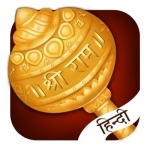
Hanuman Chalisa,Sunderkand in Hindi-Meaning pro
Lifestyle and Music
App
In this beautifully designed devotional application includes everything of hanuman ji like Hanuman...
